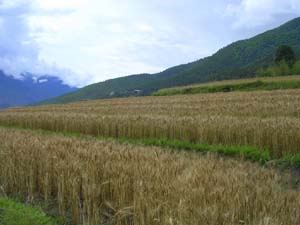 A few months ago, the small Buddhist country of Bhutan announced their intention to be the first 100% organic country.
A few months ago, the small Buddhist country of Bhutan announced their intention to be the first 100% organic country.
An ambitious and, some might say, impossible goal. Though if you know anything about Bhutan, you know that if any nation was poised to do it, it would be them.
A Mahayana Buddhist country, Bhutan has long been a role model for sustainable development and preservation of biodiversity. When larger, more developed countries want to learn how to design policy and implement proactive conservation efforts, they look to Bhutan.
The list of accomplishments is mighty: 60% of land is designated to remain forest, 40% is designated as national parks and/or wildlife refuge, and a goal of total agricultural self-sufficiency has been set for 2015.
This latest initiative, known as the National Organic Policy (NOP), was announced by Prime Minister Jingme Thinley at the Rio +20 Conference of Sustainable Development.
Prime Minister Thinley expressed the government’s beliefs that “working with nature” is the sane, impactful and healthy path to long reaching powerful results. This means no pesticides or herbicides, no GMOs, no fluoride and no Monsanto.
What will the National Organic Policy involve?
In logistical terms, organic can be defined as crop grown without direct or indirect exposure to chemicals. This includes run off from neighboring farms.
Land must be free of chemicals for at least three years, the compost, whether kitchen compost or manure, must also be free of chemicals (this means not feeding livestock chemicals that would then come out in their waste). The water used to irrigate the crops must be chemical free as well.
A tall order, but the impact on human and animal health is vast. The foods produced from organic methods are rich in nutrients, toxin free, and the growing methods help preserve bio-diversity.
Organic farming is safer for the farmers who aren’t exposed to chemicals regularly and drinking water becomes cleaner when there is no chemical run-off.
These reasons, health, taste, ecology, cost efficiency, not to mention providing for posterity, would be enough to make the move to fully organic. The government of Bhutan seems to know it can’t rest on its laurels and take its natural resources for granted.
Bhutan, with its 700,000 citizens comprised of up to three-quarters Buddhists, has deeper reasons for this initiative that lie beyond the ones obvious to our western eyes.
As Buddhists, there is a deeply rooted understanding that “self and land’ are one. Dependent arising 101. What affects one affects the other.
In Bhutan, it is well known: to respect the land is to respect human life.
The initiative is not without its challenges. A booming population and a younger generation not inclined toward farming make the future uncertain.
Minister of Agriculture and Forestry, Dr. Pema Gyamtsho, speaks wisely and practically when he says the NOP will be realized, “region by region and crop by crop.” As yet, the government has set no timeline but they had best hurry! Niue, a small island country in the South Pacific has set 202o as their 100% organic goal!
Body Mind Spirit Journeys is offering a Bhutan tour December 7 – 18, 2014. For complete details about the “Mastering the Buddha Nature Within” tour of Bhutan, please Click Here.